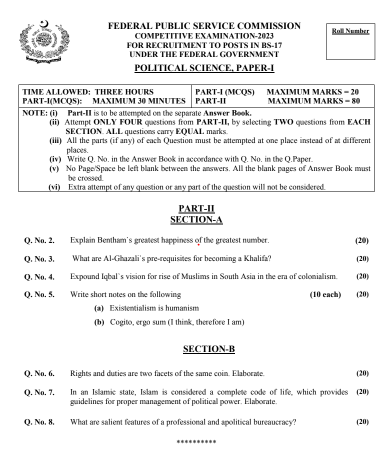Table of Contents
ToggleCSS Political Science Paper 2023 PAPER-I
SECTION-A
Q. No. 2. Explain Bentham’s greatest happiness of the greatest number. (20 marks)
Q. No. 3. What are Al-Ghazali’s prerequisites for becoming a Khalifa? (20 marks)
Q. No. 4. Iqbal’s vision for the rise of Muslims in South Asia in the era of colonialism. (20 marks)
Q. No. 5. Write short notes on the following (10 marks each)
- Existentialism in humanism
- Cogito, ergo sum (1 think, therefore I am)
Section-B
Q. No. 6. Rights and duties are the two facets of the same coin. Elaborate. (20 marks)
Q. No. 7. In an Islamic state, Islam is considered as a complete code of law, which provides guidelines for proper management of political power. Elaborate. (20 marks)
Q. No. 8. What are the salient features of a professional and apolitical bureaucracy? (20 marks)
Summary:
Q. No. 2. Explain Bentham’s greatest happiness of the greatest number. (20 marks)
Bentham’s principle of “the greatest happiness of the greatest number” is the foundation of his utilitarian philosophy. He believed that actions should be judged based on their consequences, with the goal of maximizing happiness and minimizing suffering. The principle suggests that the best action is the one that promotes the most happiness for the most people. This approach prioritizes collective well-being and provides a framework for evaluating moral and social decisions.
Q. No. 3. What are Al-Ghazali’s prerequisites for becoming a Khalifa? (20 marks)
Al-Ghazali, a renowned Islamic philosopher, outlined several prerequisites for someone to be a Khalifa (a leader or successor). He believed that the Khalifa should possess moral integrity, wisdom, justice, and a deep understanding of both religious and worldly affairs. The Khalifa must be a protector of Islam, a leader who guides the community in accordance with divine principles, and should demonstrate compassion, leadership skills, and a commitment to fairness.
Q. No. 4. Iqbal’s vision for the rise of Muslims in South Asia in the era of colonialism. (20 marks)
Iqbal’s vision for the rise of Muslims in South Asia during colonial rule focused on political and spiritual revival. He advocated for self-determination, economic empowerment, and the reclamation of cultural and intellectual strength. Iqbal emphasized the importance of unity among Muslims and their ability to regain their rightful place in society by reconnecting with Islamic principles while adapting to modernity. He envisioned a separate Muslim state, which later led to the creation of Pakistan.
Q. No. 5. Write short notes on the following (10 marks each)
- Existentialism in Humanism
Existentialism in humanism refers to the philosophical movement that emphasizes individual freedom, choice, and responsibility. It rejects the idea that human beings have an inherent purpose and instead asserts that individuals must define their own meaning and values. Key figures like Jean-Paul Sartre argued that existence precedes essence, meaning that humans first exist and then define their essence through actions. - Cogito, ergo sum (I think, therefore I am)
The phrase “Cogito, ergo sum,” coined by René Descartes, is a foundational statement in modern philosophy. It asserts that the very act of doubting or thinking proves the existence of the self. Descartes argued that while all other knowledge could be uncertain, the certainty of one’s own thoughts and existence is undeniable. This idea serves as a starting point for further exploration of knowledge and reality.
SECTION-B
Q. No. 6. Rights and duties are the two facets of the same coin. Elaborate. (20 marks)
Rights and duties are interdependent concepts that complement each other in a functioning society. Rights are the privileges or entitlements individuals have, while duties are the responsibilities or obligations they owe to others or society. The exercise of rights often involves the fulfillment of corresponding duties. For example, the right to freedom of speech is coupled with the duty to respect others’ right to the same. This interrelation emphasizes the balance between individual freedoms and social harmony.
Q. No. 7. In an Islamic state, Islam is considered as a complete code of law, which provides guidelines for proper management of political power. Elaborate. (20 marks)
In an Islamic state, Islam is viewed as a comprehensive legal and moral system that governs all aspects of life, including politics, economics, and social interactions. Sharia law, derived from the Quran and Hadith, provides the framework for governance. The state is expected to uphold justice, fairness, and the welfare of its citizens, guided by Islamic principles. Political power, according to Islamic teachings, must be exercised in alignment with divine law and for the benefit of the people.
Q. No. 8. What are the salient features of a professional and apolitical bureaucracy? (20 marks)
A professional and apolitical bureaucracy is characterized by merit-based recruitment, impartiality, efficiency, and neutrality in the implementation of policies. It operates independently of political influence, ensuring that decisions are made based on expertise and public interest rather than partisan interests. The focus is on professionalism, transparency, and accountability, with civil servants dedicated to serving the public, regardless of political shifts or affiliations. This system promotes stability and effectiveness in governance.
